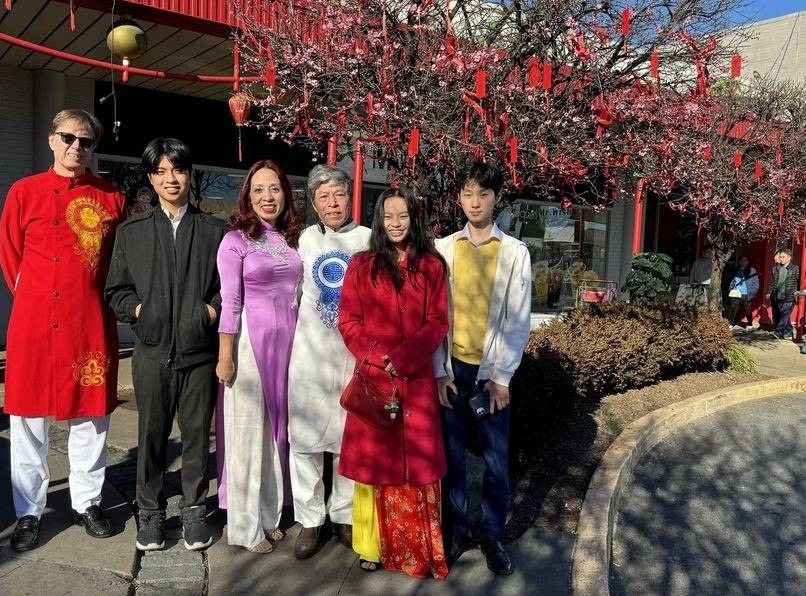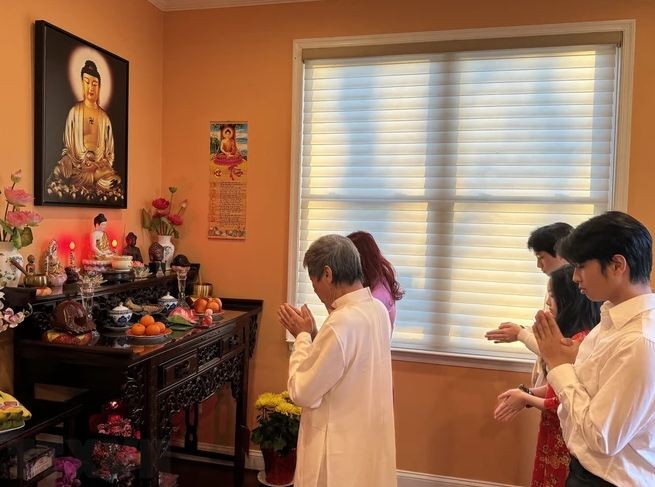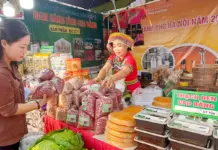During every Spring Festival, Nguyen Phuong Thao, an overseas Vietnamese residing in Washington D.C, seizes the opportunity to take her entire family to the Vietnamese market for Tet (Lunar New Year) shopping. This tradition allows them to recreate the taste of Tet in their homeland and to educate her children and grandchildren about the cultural significance of Tet.
Thao shared with reporters from the Vietnam News Agency in Washington that this year’s Tet held a special meaning for her family as they welcomed her biological father from Vietnam. It provided an opportunity for the children and grandchildren to come home and celebrate a weekend-long Tet holiday.
 |
| Nguyen Phuong Thao’s family posing for a photo next to the ornamental peach blossom tree at the Vietnamese market in the US. Photo: VNA |
Thao moved to the US to work for the World Bank and has been living in the state of Virginia for nearly 20 years.
On his first Tet celebration with Thao’s family in the US, Nguyen Hoang Nghia, Thao’s father, felt less homesick when his children and grandchildren took him Tet shopping at a Vietnamese market in Virginia.
Nghia noted that Tet in the US is quite similar to Vietnam, with abundant Tet goods available. Through Tet shopping with his children and grandchildren, he can teach them about the traditional customs during Tet in Vietnam. These customs include the importance of cleaning and decorating the house, buying flowers like peach branches and apricot branches, and exchanging best wishes. Additionally, children receive lucky money from adults at the beginning of the year.
Thao expressed her emotional attachment to the Tet atmosphere in the US. As someone from Hanoi, she still misses certain aspects of Tet in Vietnam, such as peach blossom branches, kumquat trees, and dong leaves.
“In the US, it is difficult to boil banh chung in the yard or on the street like in Vietnam due to fire safety concerns. With no relatives or a complete family to come and celebrate Tet, and children not receiving lucky money, I still miss the Tet atmosphere in my hometown,” Thao lamented.
Perhaps because it is not as complete as the Tet atmosphere in her hometown, Thao always makes an effort to wrap banh chung (square glutinous rice cake) and take her entire family shopping to remind her children of the flavors of Vietnamese Tet.
This year, the Vietnamese Tet market not only offers familiar products and traditional ao dai clothing but also features an area decorated with Tet couplets, allowing everyone to understand the filial piety and Tet customs of the Vietnamese people.
This novelty is particularly exciting for Vietnamese children born and raised in the US, like Cam Tu, Thao’s daughter, who have never experienced Tet in Vietnam.
 |
| Thao’s entire family lighting incense to worship their ancestors during Tet. Photo: VNA |
Discussing her limited knowledge of Vietnamese, Cam Tu said, “Today, I learned more about Tet flowers such as chrysanthemums, claliolus, and narcissus that are typically displayed during Tet. I will try to improve my Vietnamese so I can learn more about Tet in Vietnam. Although I can only understand and speak a little Vietnamese, I am already 15 years old, yet I have never returned to Vietnam to celebrate Tet.”
The atmosphere of family reunions, heartfelt well wishes exchanged during Tet, and enjoying traditional dishes like green chung cake and red couplets are characteristic of Tet celebrations.
Tet has become very familiar to Thao’s husband, James Gaites. For him, the elegant red ao dai is an essential element of Tet attire. He never fails to wear a red ao dai on special occasions in Vietnam.
This year, James purchased an ao dai with an embroidered dragon image to mark the Year of the Dragon in 2024.
James has visited Vietnam twice but has never spent Tet holiday there. He admires his wife’s cooking skills and truly enjoys Vietnamese cuisine, especially banh chung made by his wife during Tet. Together, they wrap a considerable amount of banh chung every year. While his wife usually prepares fried banh chung, he prefers the boiled version.
However, Vietnamese families, particularly those of Northern origin, still miss some familiar elements that cannot be found in Vietnamese Tet markets in the US, such as dong leaves, peach branches, and kumquat trees.
The fond memories of Tet for those living far away from home will never fade away. This nostalgia will endure and be passed down to future generations, as remembering Tet means cherishing the culture and the traditional beauty that carries the unique identity of the Vietnamese people.








